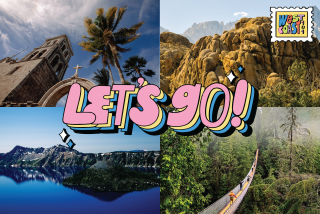Israel’s Modern Miracle on the Red Sea Coast : The fathers of tourism in Eilat didn’t need to part the waters to create an international resort.
- Share via
EILAT, Israel — Of all the miracles in this country’s 44 years of stormy history, few have been more helpful in opening the doors to outside visitors than the emergence of Eilat. During the past decade or so, this small city on the Red Sea’s Gulf of Aqaba has become an international resort of considerable renown.
Israel’s southernmost town, Eilat (pronounced Eh-lot) was mentioned a number of times in the Old Testament. Jews stopped here during their exodus from Egypt to the Promised Land 12 centuries before Christ. It was at one time ruled by the Egyptians, Romans, Arabs, Byzantines, the Crusaders, Turks and British. Still, until its capture by the Israelis in spring, 1949, during the last military operation of their war of independence, Eilat was the backwater to end all backwaters, a parched little police outpost that showed little promise of becoming much else.
Even though Eilat is Israel’s most southerly port and the country’s only access to the Red Sea, it saw little growth or progress for decades. Finally, word-of-mouth from adventurous visitors spread the notion that here indeed was a paradise of eternal summer, with a pristine sea and great water sports, at the nexus of tranquil borders with Egypt, Jordan and Saudi Arabia.
It was about the mid-1970s that city fathers decided where the town’s future lay: in tourism. When Northern Europeans (Sweden sends the most visitors annually) returned home with glowing accounts of ceaseless sunshine, charter flights began arriving, hotels sprang up helter-skelter and night life joined water sports to create a round-the-clock frivolity. Eilat is probably the only Israeli city where the presence of religion doesn’t hold the limelight.
Yet once the discos close and the snorkeling gear comes off, there’s still plenty to fill days and evenings. The Coral World Underwater Observatory--viewed through panoramic windows--is nothing less than spectacular, giving a close-up view of the Red Sea’s distinct sea life and radiant coral reefs. From the observatory’s 80-foot tower, there are magnificent views of the landscapes and seascapes of Israel and surrounding countries.
You can take a Jeep or camel safari into Egypt’s Sinai (one to five days), perhaps visiting the Hai Bar Nature Reserve. The nearby Timnacq Valley features breathtaking sandstone vistas and the ancient Egyptian temple of Ta’amorcq, with its animal wall paintings.
Bird-watchers will delight in knowing that Eilat has about 400 species of songbirds and water fowl, and more than 1 million raptors of 30 types migrating yearly. It’s a wonder all of them don’t stick around, what with a year-round temperature seldom lower than 70 degrees.
How long/how much? Give Eilat and its surroundings at least a couple of days, although many visitors fly down from Jerusalem or Tel Aviv just for a day, others for a week’s holiday. Lodging and dining costs are moderate to high.
Getting settled in: The Lagoona Hotel, like most of Eilat’s hotels, is ultra-modern and built around a spacious sun deck with a pool and children’s pool. There’s also a structured children’s activities program and playground, and a public beach 100 yards from the hotel. The Bedouin Tent, complete with colorful desert trappings, is one of several restaurants, cafes and grills within the hotel.
Sport Hotel, in the same area, is just as contemporary as the Lagoona, but adds five flood-lit tennis courts, two courts for volleyball-basketball and three for racquetball, just to measure up to its name. There’s also a fully-equipped gym, Jacuzzi and sauna, plus two restaurants and an American-style deli.
The absolutely gigantic King Solomon’s Palace is Eilat’s finest and, while offering most of the amenities and activities of the Lagoona and Sport, tosses in Italian and Chinese restaurants, a French brasserie , an outdoor barbecue and an on-property synagogue. There’s also a late-night disco.
Regional food and drink: Buffet breakfasts in Eilat hotels are more than spectacular, bordering on disbelief: fresh fruits, melons and dates from kibbutzim farms, great vegetable salads, herring, smoked salmon, several dozen other choices and topped off with hot cheesecake. Try one on for size.
Fresh seafood is a staple here. A particular favorite is denes sea bream, a delectable white-fleshed fish usually prepared simply with olive oil and lemon. Desert-style fare, including couscous, Moroccan salads and the ever-available hummus and falafel, appears often on menus, with the latter two items served as first courses and also at street stalls.
Goldstar and Maccabee are two excellent Israeli beers, and they help to take the sting out of Eilat’s heat.
Good local dining: Eilat, as an international resort, serves up the food of numerous nations and ethnic groups. Mai Thai (Yotam Road) is a simple Thai-Chinese place, with Thai umbrellas hanging upside down from the ceiling. Both the coconut and hot-and-sour soups ($2.50) were marvelous, and the satays of beef with garlic and peppers ($9) were as good as we’ve ever had. Mai Thai’s best deal is a four-course set menu of soup, egg roll, any main course and dessert for $15.
Au Bistro (Eilot Street) is a small and rather formal place of royal blue walls and white woodwork, crisp linens and an intimate ambience. It’s also regarded as the best seafood restaurant in town, although the menu is a formidable balance of other French dishes. Start with the hot foie gras in a cassis sauce ($10), or Burgundy snails in garlic ($6.50). The denes sea bream with lemon and basil is $12; a Chateaubriand for two with bearnaise sauce costs $31. Au Bistro is a family-run affair, with the chef-husband and son in the kitchen, and the wife major-domo in the dining room.
Everything about El Gaucho (Haarava Road) will whisk you straight down to the Pampas, from the Argentine decor to the authentic gaucho costumes of cooks and other help, to the asado (a pit of slow-burning wood), where lamb and other meats are impaled on steel crosses that stand in the smoldering coals. Have a go at the chorizo steak, a triple-width strip sirloin ($12), or a mixed grill of a half-dozen meats ($21 for two). All main courses are served with an Argentine salad and chimichurri sauce (olive oil, vinegar, cilantro and tons of garlic) for the meat. House wines are priced at $8 a liter, $2 by the glass. El Gaucho is a carnivore’s hereafter.
On your own: Have a look at the gulf’s incredible undersea life, coral reefs and sponge gardens aboard the Jules Verne Explorer, a ship with a window-walled terrace beneath the waterline. There are several cruises daily ($15) and a night cruise with dinner on deck. Then descend to the undersea terrace, where projector lights create a new kind of night life as sea creatures of every description scurry about.
Just off the gulf’s Southern Beach is Dolphin Reef, where young women train and swim with six of these friendly sea mammals in their natural habitat. Visitors may swim six-at-a-time with the friendly dolphins as well, $20 for half an hour.
Aqua Sport is a Red Sea diving center that gives lessons, rents diving equipment and offers Jeep-camel diving safaris along the Sinai coast. For information, contact Aqua Sport’s local representative: Sea Safaris, 3770 Highland Ave., Suite 102, Manhattan Beach, (310) 546-2464.
Snorkeling buffs need only a mask and bathing suit for exploring some of the most exciting and clear waters anywhere on earth. And for non-divers, there are half- and full-day Jeep treks to a variety of destinations in the Negev Desert.
GUIDEBOOK
A Lot About Eilat
Getting there: Fly El Al Israel Airlines, Delta or TWA to Tel Aviv, then El Al on to Eilat in 35 minutes. An advance-purchase, round-trip ticket to Tel Aviv will cost $1,222-$1,407 through October, $928-$1,222 as of next Sunday, Nov. 1. The Eilat leg is $160 round trip. Keep in mind that El Al doesn’t fly on Sunday.
A few fast facts: Israel’s shekel recently sold for about 2.03 to the dollar, 49 cents each. Visit Eilat any time of year for daylong sunshine. Even June, July and August are made bearable by the dry desert heat, and rain is a rarity.
Where to stay: Hotel Lagoona (North Beach; $128 double B&B;); Sport Hotel (North Beach; $150 double B&B;); King Solomon’s Palace (North Beach; $166 double B&B;). A variety of seasons, some based on Jewish holidays, affect hotel rates, so call (201) 816-0830 for the very latest rates on these hotels, plus costs for attractive multiday rates, including air fare from Tel Aviv.
For more information: Call the Israel Government Tourist Office at (213) 658-7462, or write (6380 Wilshire Blvd., Suite 1700, Los Angeles 90048) for a brochure on Eilat, a map of the city, brochures on diving in the region, plus information and map for traveling elsewhere in Israel.
More to Read
Sign up for The Wild
We’ll help you find the best places to hike, bike and run, as well as the perfect silent spots for meditation and yoga.
You may occasionally receive promotional content from the Los Angeles Times.






